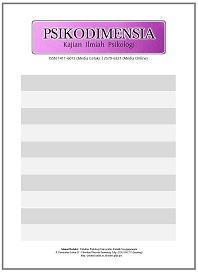Kepuasan Hidup dan Flourishing pada Karyawan Tambang
Abstract
Pertambangan merupakan bidang pekerjaan yang terdengar menjanjikan. Namun, pada pertambangan juga terdapat risiko yang sangat besar. Risiko yang ada dapat menjadi penyebab kekhawatiran dan berdampak pada proses individu untuk flourish. Selain itu, lingkungan kerja yang penuh aturan, jam kerja yang padat akan berdampak pada kepuasan hidup individu. Penelitian ini bertujuan untuk mengetahui seberapa besar pengaruh kepuasan hidup terhadap flourishing. Penelitian ini merupakan penelitian kuantitatif non-eksperimen dengan pendekatan korelasional pada karyawan pertambangan berjumlah 292 orang. Skala yang digunakan adalah Satisfaction with Life Scale dan Flourishing Scale. Analisis dilakukan dengan regresi linear sederhana dan hasil menunjukkan bahwa kepuasan hidup berkorelasi positif dengan flourishing (R=0,626; p<0,01) dan memberikan pengaruh sebesar 44,1%. Artinya, untuk dapat flourish individu perlu untuk puas terhadap hidupnya
Keywords
Full Text:
PDF (Bahasa Indonesia)References
American Psychological Association. (2011). High-risk jobs and high risk populations. https:// www.apa.org/wsh /past/2011/high-risk-jobs
Datu, J. A. D. (2018). Flourishing is associated with higher academic achievement and engagement in Filipino undergraduate and high school students. Journal of Happiness Studies, 19(1), 27–39. https://doi.org/10.1007/S10902-016-9805-2
Diener, E., Emmons, R. A., Larsen, R. J., & Griffin, S. (1985). The satisfaction with life scale. Journal of Personality Assesment, 49(1), 71–75.
Diener, E., Wirtz, D., Tov, W., Kim-Prieto, C., Choi, D. won, Oishi, S., & Biswas-Diener, R. (2010). New well-being measures: Short scales to assess flourishing and positive and negative feelings. Social Indicators Research, 97(2), 143–156. https://doi.org/10.1007/ s11205-009-9493-y
Effendy, N., & Subandriyo, H. (2017). Tingkat flourishing individu dalam organisasi PT X dan PT Y. Jurnal Eksperientia, 5, 1–18.
Harimukthi, M. T., & Dewi, K. S. (2014). Eksplorasi kesejahteraan psikologis individu dewasa awal penyandang tunanetra. Jurnal Psikologi Undip, 13(1), 64–77. https://doi.org/10.14710/jpu.13.1. 64-77
Huppert, F. A., & So, T. T. C. (2009). What percentage of people in Europe are flourishing and what characterises them? Measuring Subjective Well-Being, Florence-July 23/24, 1–7.
Imran, M. Y., Elahi, N. S., Abid, G., Ashfaq, F., & Ilyas, S. (2020). Impact of perceived organizational support on work engagement: Mediating mechanism of thriving and flourishing. Journal of Open Innovation: Technology, Market, and Complexity, 6(3), 1–18. https://doi.org/ 10.3390/ JOITMC6030082
Jimenez, P., & Dunkl, A. (2017). The buffering effect of workplace resources on the relationship between the areas of worklife and burnout. Frontiers in Psychology, 8(JAN), 1–10. https://doi. org/10.3389/fpsyg.2017.00012
Juliana, M., Camelia, A., & Rahmiwati, A. (2018). Analisis faktor risiko kelelahan kerja pada karyawan bagian produksi PT. Arwana Anugrah Keramin, Tbk. Jurnal Ilmu Kesehatan Masyarakat, 9(1), 53–63. https://doi.org/10. 26553/jikm.2018.9.1.53-63
Keyes, C. L. M. (2016). Well-being and higher education: A strategy for change and the realization of education’s greater purposes (D. W. Harward, Ed.; Issue January). Bringing Theory to Practice.
Kobau, R., Sniezek, J., Zack, M. M., Lucas, R. E., & Burns, A. (2010). Well-Being Assessment: An Evaluation of Well-Being Scales for Public Health and Population Estimates of Well-Being among US Adults. Applied Psychology: Health and Well-Being, 2(3), 272–297. https://doi. org/10.1111/j.1758-0854.2010.01035.x
Law, D. M., Shapka, J. D., & Collie, R. J. (2020). Who might flourish and who might languish? Adolescent social and mental health profiles and their online experiences and behaviors. Human Behavior and Emerging Technologies, 2(1), 82–92. https://doi.org/10.1002/ hbe2.172
Masturah, A. N., & Hudaniah. (2022). Efikasi diri dan dukungan sosial sebagai prediktor flourishing pada dewasa awal. Jurnal Ilmiah Psikomuda Connectedness, 2(1), 10–18.
Nelson, S. K., Layous, K., Cole, S. W., & Lyubomirsky, S. (2016). Do unto others or treat yourself? The effects of prosocial and self-focused behavior on psychological flourishing. Emotion, 16(6), 850–861. https://doi.org/ 10.1037/ emo0000178
Parola, A., & Marcionetti, J. (2023). Positive resources for flourishing: The effect of courage, self-esteem, and career adaptability in adolescence. Societies, 13(1), 1–12. https:// doi.org/10.3390/soc1 3010005
Redelinghuys, K., Rothmann, S., & Botha, E. (2019). Flourishing at work: The role of positive organizational practices. Psychological Reports, 122(2), 609–631. https://doi.org/10.1177/ 0033294118757935
Santisi, G., Lodi, E., Magnano, P., Zarbo, R., & Zammitti, A. (2020). Relationship between psychological capital and quality of life: The role of courage. Sustainability (Switzerland), 12(13), 1–14. https://doi.org/10.3390/su12135238
Schotanus-Dijkstra, M., Pieterse, M. E., Drossaert, C. H. C., Westerhof, G. J., de Graaf, R., ten Have, M., Walburg, J. A., & Bohlmeijer, E. T. (2016). What factors are associated with flourishing? results from a large representative national sample. Journal of Happiness Studies, 17(4), 1351–1370. https://doi.org/10.1007 /s10902-015-9647-3
Schotanus-Dijkstra, M., Ten Have, M., Lamers, S. M. A., De Graaf, R., & Bohlmeijer, E. T. (2017). The longitudinal relationship between flourishing mental health and incident mood, anxiety and substance use disorders. European Journal of Public Health, 27(3), 563–568. https://doi.org/10.1093/eurpub/ckw202
Sugiyono. (2018). Metode penelitian kuantitatif (Setiyawami, Ed.; 1st ed.). Alfabeta.
Umucu, E., Grenawalt, T. A., Reyes, A., Tansey, T., Brooks, J., Lee, B., Gleason, C., & Chan, F. (2019). Flourishing in Student Veterans With and Without Service-Connected Disability: Psychometric Validation of the Flourishing Scale and Exploration of Its Relationships With Personality and Disability. Rehabilitation Counseling Bulletin, 63(1), 3–12. https://doi. org/10. 1177/0034355218808061
Wahyuni, E., & Maulida, I. (2019). Hubungan antara kepuasan hidup dan kesejahteraan psikologis pada siswa SMA Negeri Se-Jakarta Pusat. INSIGHT: Jurnal Bimbingan Konseling, 8(2), 173–180. https://doi.org/10.21009/insigh t.082.08
DOI: https://doi.org/10.24167/psidim.v22i1.10049
Print ISSN : 1411-6073 | online ISSN : 2579-6321 View My Stats

This work is licensed under a Creative Commons Attribution 4.0 International License.




















